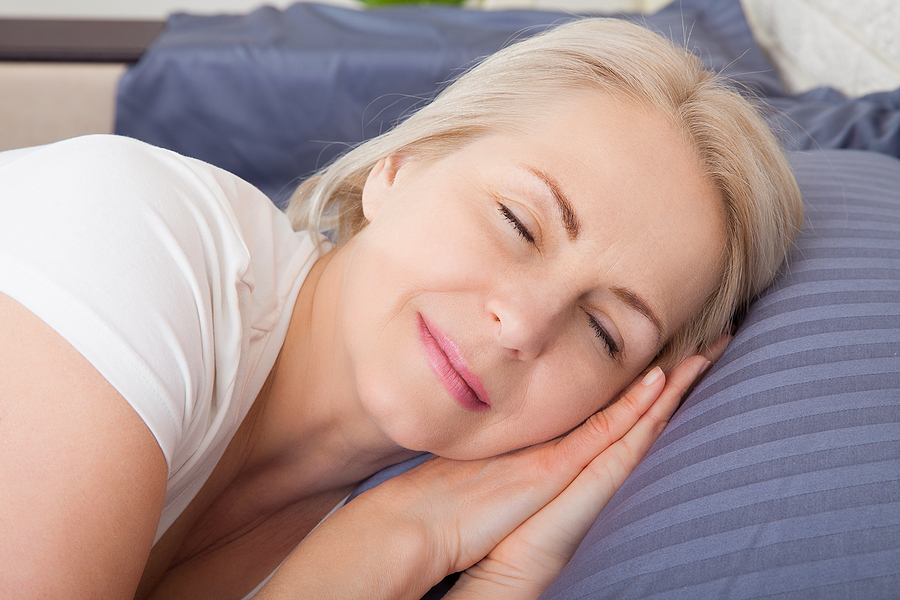Kelly came to see me the other day, frustrated and angry about the weight she just couldn’t lose. She told me she was living a busy life (as so many women are), helping her children manage their remote school days, working full time, volunteering in the community, and trying to squeeze in time to connect with her husband.
But even with all that going on, she said, she was making time to prepare healthy foods and exercise regularly. She just couldn’t figure out why she couldn’t get rid of those extra pounds.
She seemed surprised when I asked her about her sleep schedule. Why would that matter? she asked, after describing her regular routines and confirming that she was rarely able to get the recommended 7-9 hours of quality sleep per night.
Kelly isn’t alone in being unaware of how connected sleep and weight loss can be. Sleep regenerates cells, slows aging, and enhances fat burning processes in your body.
That’s why protecting your sleep is such a powerful way to prompt weight loss when nothing else seems to work. Research has indicated that those who sleep more than 7 hours per night lose 55% more fat than those who don’t.
Quality sleep has also been shown to reduce hunger and cravings, changing eating behavior in positive ways. And there are myriad benefits beyond weight loss that come from getting an adequate amount of sleep each night.
In this article, I’ll share the connections between sleep and weight loss, including the connections between hormones and sleep, and I’ll also talk about circadian rhythms. Then, I’ll give you 10 simple ways to optimize your sleep cycle to ramp up weight loss.
Sleep, weight and hormones: how are they connected?
Hormones have a vital impact on the way your body functions. That’s why hormonal imbalance has such a profound impact on so many aspects of health, including weight.
Sleep is an essential piece of the hormonal puzzle; this is when your body resets the hormones for optimal balance. Daylight used to be the primary factor in when people rose and went to bed – and then electricity came along.
Suddenly, it could be light 24/7. While certainly useful, the invention of electricity began the slow decline of sleep as people could continue working, reading or playing long after the sun went down.
When electronics such as television, computers, tablets and cell phones entered the picture, sleep took an even harder hit. These technologies are not only addictive, but raise cortisol levels, thus impacting blood sugar levels and prompting the release of insulin.
Eventually, this can lead to insulin resistance, a cycle of cravings, and elevated levels of cortisol and insulin that can lead to weight gain.
Sleep helps combat that problem, lowing insulin and cortisol levels. It also lowers leptin, commonly known as the “hunger hormone.” And sleep raises other important hormone levels, including melatonin, human growth hormone, and sex hormones.
When you stay up late, especially if you’re on devices that emit blue light, your body gets confused. Your internal clock believes that it’s daytime, and the rhythm becomes more and more out of sync. This leads to fatigue and weight gain.
The relationship between hormones and sleep
The hormonal relationship is complex and confusing, in part because there are so many hormones and they’re all linked in one way or another. If levels of one are off, others are impacted, and the downward spiral begins.
Additionally, hormone levels that are too high or too low can have a direct impact on your ability to fall – or stay – asleep. Let’s take a brief look at some that are highly impacted by lack of sleep, and the difficulty they can create in getting quality sleep.
Estrogen, Progesterone and testosterone are all important to consider when talking about sleep. If these sex hormones are out of balance, symptoms that make sleep difficult can result, including hot flashes and night sweats.
Low levels of progesterone can make it difficult to fall asleep and increases in estrogen can also interrupt sleep patterns. Depression and mood swings, often caused by hormonal imbalances, can also make sleep tricky.
Human growth hormone (HGH) stimulates cell reproduction and repair. HGH is produced by the pituitary gland and is mostly released as you sleep, especially during the deep (slow wave) sleep phase.
This is the most restorative stage of sleep, and it helps your body recover from everyday stress. Sleep disturbances can disrupt the release of HGH and impact sleep cycles.
Cortisol and adrenaline are stress hormones, released as part of your body’s natural response to stress. When levels of these hormones are too high, it’s unlikely your body will feel ready to sleep.
Cortisol levels are naturally designed to be higher in the morning and lower at night. If your circadian rhythm is turned around, sleep issues are likely.
Two hormones that relate to sleep and weight loss directly are leptin and ghrelin. Trouble with sleep has been associated with high levels of both leptin, which signals you are full, and ghrelin, which makes you feel more hungry.
This can be a recipe for disaster.
If you’re up, and feeling hungry, you may end up in the kitchen eating almost unconsciously. And your cravings are far more likely to be for sugar and carbohydrates than fresh vegetables!
Melatonin is the hormone most often associated with sleep. It impacts your internal clock, and is released as light fades to signal your body that it’s time to sleep.
Artificial light has had a big impact on melatonin production, so finding ways to eliminate exposure to this kind of light in the evening can be a big help.
How circadian rhythms impact sleep
You’ve probably heard that your circadian rhythms (physical, mental and behavioral cycles) impact sleep.
But knowing and understanding are two different things.
We’ve talked about how light impacts sleep – and that’s due to these natural rhythms, which impact produced by biological clocks.
That’s right, I said clocks. Despite the popular misconception that you have one biological clock, you actually have them in most of the organs and tissues throughout your body.
These biological clocks control the timing of circadian rhythms.
The suprachiasmatic nucleus (SCN) is the “master clock” that keeps all of the others in sync. This SCN gets its information directly from input through your eyes.
Dimming light sends the message that it’s time for melatonin production. So, if that light never fades as you bombard your eyes with artificial light, your SCN won’t get the right signal. Those circadian rhythms end up upside down, and sleep can suffer.
10 Ways to Optimize Your Sleep Cycle and Lose Weight
No one wants to go back to the days without electricity, and a world without electronic devices seems unthinkable to many people now. We don’t have to reject modern conveniences completely – we just need to learn to use them responsibly.
When we do, we’ll get the sleep our bodies require. And that will allow us to release the extra weight our bodies hold on to. Here are some quick tips for resetting your sleep cycle to a natural, healthy pattern.
1. Choose a bedtime…and stick with it.
Ideally, this will be by 10 pm. It’s best to have the same bedtime regardless of what day it is. Though it’s tempting to stay out late on weekends, when you do so consistently. It’s difficult for your body to maintain healthy rhythms. It’s also best to wake up at the same time each day.
2. Use light, not sound, to wake you up.
An alarm clock that simulates natural light is a great choice. If you won’t wake up without an alarm, open the blinds and expose yourself to natural light as quickly as possible. Enjoying your first cup of coffee or tea in the yard is a great opportunity to use the early morning light to help reset your cycle.
3. Decrease the amount of artificial light you use before bedtime.
At least an hour before bed (two is better) try to dim the lights in your home and put electronics away. If you have to use your screens, at least put them on night mode to help sleep hormones do their work.
4. Avoid caffeine and alcohol late in the day.
When you reach for an afternoon soda, coffee or energy drink you’re setting yourself up for a long night of wakefulness. Consuming alcohol in general stalls fat burning mechanisms for several hours. And alcohol too close to bedtime can cause restless sleep as your body processes it.
5. Make dinner the last thing you eat – and have it at least two hours before bed.
Digestion and absorption are long, complicated processes. Your body needs at least ten hours without food to reset your hormones. Carbs before bed are a problem for another reason: too many carbs make blood sugar levels drop, which prompts the release of cortisol. In the middle of the night, cortisol becomes an internal alarm clock!
6. Establish practices that reduce stress in your life.
Exercise, a relaxing bedtime routine, a healthy diet, and meditation or breathing exercises are all great ways to reduce the constant barrage of stressors we face daily.
7. Be more active.
Regular physical activity is a great way to help you get the quality sleep you need, just be sure to avoid vigorous exercise too close to bedtime. Any physical activity will make a difference, and a commitment to twenty or thirty minutes of intentional exercise per day will positively impact your sleep cycle. An early morning walk can help you start the day off right and a late afternoon workout can help shake off the pressures of work. Find something you love to do, and it won’t feel like a chore!
8. Create a bedroom sanctuary.
Be sure that your sleeping environment is conducive to restful sleep. It should be cool, quiet, and comfortable. Leave electronics outside the bedroom and develop a routine to help signal to yourself it’s time to relax.
9. Try a power nap.
If you find yourself consistently dragging during the late afternoons, try building a quick nap into your schedule. It’s a far better way to rejuvenate than coffee or a candy bar! Just be sure to keep it between 10 and 20 minutes so you don’t run through all the sleep cycles. If you feel groggy when waking from a nap, try a shorter one the next time.
10. Try gentle supplementation to reset your sleep cycle.
While melatonin is best known for supporting sleep, studies have also shown magnesium, ginkgo biloba, valerian root, lavender, and the amino acids glycine and l-theanine to be helpful. My sleep support program is a special blend that includes melatonin, L-theanine and valerian root, along with other nutrients known for calming brain activity and promoting quality sleep.
Now you know that sleep is vital for so many reasons – including losing weight! If you’re constantly sleep deprived, it’s a great place to begin when struggling with stubborn weight.
With so many easy solutions at your disposal, you can reset your sleep cycle and meet your weight loss goals. Diet and exercise are important, but quality sleep can’t be left behind!







